
John Wilkes Booth
His Life and Death
by John
T. Marck
John Wilkes Booth was born on
May 10, 1838 on a small farm known as Tudor Hall, located a few miles outside
of Bel Air, Harford County, Maryland. His parents, Junius Booth and Mary Ann
Holmes were British, and moved to the United States in 1821. John Wilkes was
the ninth born of their ten children. The Booth family stayed on their farm at
Tudor Hall in the warmer months, and also owned and used slaves. During the
winter, they would move to their other home located on North Exeter Street in
Baltimore City. His father, Junius was a very well-known actor.
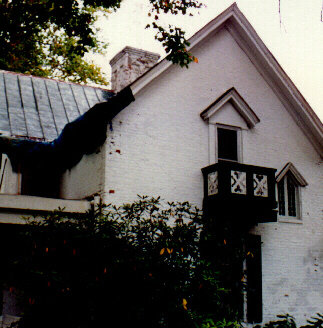
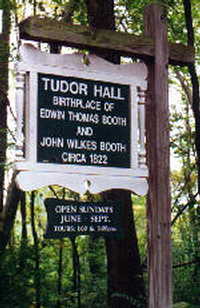
John Wilkes received his
schooling in Maryland, first at a boarding school in Cockeysville (Baltimore
County) operated by Quakers, after which he attended St. Timothy's Hall, an
Episcopal military academy in Catonsville, also in Baltimore County. As a
young man in the 1850s, Booth joined the Know-Nothing Party. This party was
formed by Americans for the purpose of preserving the country for native-born
white citizens. In 1852, his father died and John left school and spent the
next few years working on their farm near Bel Air.
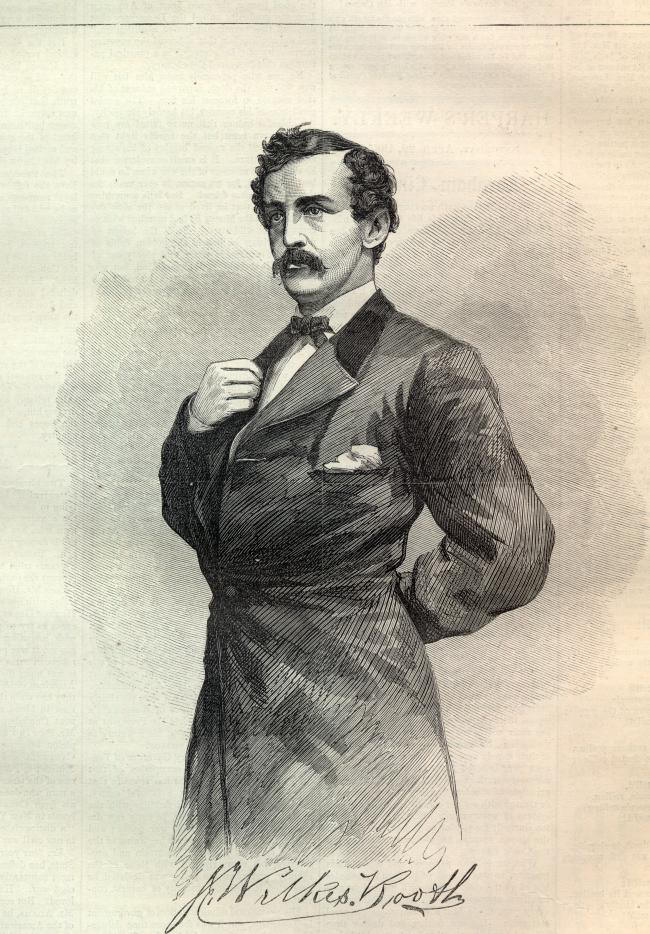
However, farming was not in
John's life plan. According to his sister, Asia Booth Clarke, he had always
wanted to be famous. So, John followed in his father's footsteps toward a
career in acting. In 1855, at the age of seventeen, Booth made his acting
debut in the production of Shakespeare's Richard III, in the role of
the Earl of Richmond. Following this, it would be two years before he again
appeared on stage. He did play minor roles in Philadelphia, but was not well
received, as he would frequently forget his cues and lines. But, desiring to
be a good actor, he did not give up, and finally landed roles in 1858 as part
of the Richmond Theatre. Living in Richmond, he became fascinated with the
people and the Southern way of life. In 1859, Booth witnessed the execution of
John Brown, working as one of the guards stationed there to prevent any
attempts to rescue Brown.
In 1860, his acting career
started to take off. He landed the role as Duke Pescara in The Apostate,
at the Gayety Theatre in Albany, New York. It was here that President Lincoln
passed through Albany en route to Washington, D.C. Booth's acting continued in
such productions as Romeo and Juliet, The Marble Heart, The Merchant of
Venice, Julius Caesar, Othello, The Taming of the Shrew, Hamlet, Macbeth,
and others. His appearances took him to New York, Boston, Baltimore,
Washington, Cleveland, Chicago, Detroit, St. Louis, Leavenworth, Nashville,
New Orleans and Richmond, prior to the Civil War. From November 2 through
November 15, 1863, Booth appeared in The Marble Heart in the role of
Raphael at Ford's theatre in Washington, D.C. It was during his November 9
performance that President Lincoln attended and saw Booth in this role. The
box where Lincoln sat was the same exact spot in which he would be later
assassinated. Following The Marble Heart at Ford's, Booth made only
one more appearance there, when on March 18, 1865, he appeared as Duke Pescara
in The Apostate. Although Booth was considered a good actor, he never
excelled to the level of talent possessed by his father, nor his brother
Edwin, who all worked together in one production of Julius Caesar. In
the play, Booth appeared as Marc Antony, while Edwin played Brutus, and their
father Julius, played Cassius. In the summer of 1864, Booth appeared in a
production at Meadville, Pennsylvania, and stayed in a room at the McHenry
House. Upon checking out, a cleaning woman attending the room found an
inscription on one of the windowpanes that read, "Abe Lincoln departed his
life August 13, 1864, by the effects of poison." Unfortunately, no one
gave it much attention, nor focused on Booth as the writer.
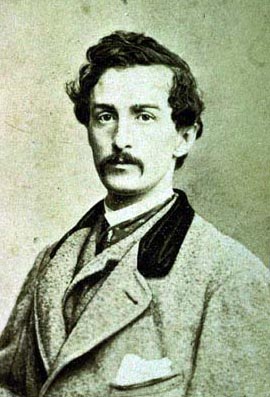
Late in the summer of 1864,
Booth began his plans to kidnap Abraham Lincoln. His idea was to abduct
Lincoln, then take him to Richmond where he would be held for ransom in
exchange for Confederate prisoners held in Union camps. Booth believed this
was one way to increase the deteriorating ranks of Rebel soldiers. To assist
him in his plan, he began recruiting helpers. He was able to recruit Michael
O'Laughlen, Samuel Arnold, Lewis Paine, John Surratt, David Herold and George
Atzerodt. A meeting was set whereby all the members met at Gautier's
Restaurant, a short distance from Ford's Theatre in Washington, and discussed
their abduction plan. A few days after this meeting, Booth became aware that
Lincoln would be attending a play at the Campbell Hospital near Washington,
D.C., on March 17, 1865. To Booth this seemed to be his best opportunity to
abduct Lincoln. That day in March came and Booth's plan was in place. Lincoln
decided at the last minute not to attend the play, but rather to speak to the
140th Indiana Regiment and present a captured Confederate flag to
the Governor of Indiana. As this plan failed, some of Booth's conspirators
became disenchanted and abandoned the group. NOTE: It should be said that many
books say that the abduction attempt actually took place, whereby Booth and
his gang saw Lincoln's carriage and started their plan, but once they realized
Lincoln was not in the carriage, they stopped. This incident never occurred.
In Booth's personal life was
a lady named Lucy Lambert Hale, the daughter of John Parker Hale, an
abolitionist senator from New Hampshire. In early 1865, the Hale family moved
into the National Hotel, in Washington, where Booth was also staying. In the
first days of March 1865, Booth became secretly engaged to Lucy. On March 4,
on the occasion of Lincoln's second inauguration, Booth invited Lucy as a
guest. In his quest for Lincoln, Booth once confided to an actor friend by the
name of Samuel Knapp Chester, that, "What an excellent chance I had to
kill the President, if I had wished, on inauguration day!" Booth and his
conspirators had other plans to kidnap Lincoln, specifically at a theatre, but
these plans fell through. Then on April 9, 1865, General Robert E. Lee
surrendered the Army of Northern Virginia to General Grant, effectively ending
the Civil War. Two days later, President Lincoln gave a speech at the White
House where he discussed possible new rights for blacks. In the audience were
Booth, Herold and Paine. The speech enraged Booth, and he vowed to silence
Lincoln.
April 14, 1865
The following outlines the
activities John Wilkes Booth, the day of the assassination.
At about 9:00 a.m., Booth met
with his fiancée, Lucy, at the National Hotel. The National Hotel was
originally located at the northeast corner of Sixth Street and Pennsylvania
Avenue. It was demolished in the 1930s. They parted, then he went to Booker
and Stewart's barbershop on E Street. Here barber Charles Wood gave him a
haircut. Upon leaving the barbershop he stopped by the Surratt boardinghouse
and met with Mary Surratt. He then returned to his room, number 228 at the
National Hotel. Booth seemed to be normal in his activities and behavior
according to witnesses who saw him at the hotel. After a short while, Michael
O'Laughlen stopped by his room and visited with Booth.
Two hours later, at 11:00
a.m., Booth went to Ford's Theatre to pick up his mail. While there he spoke
with Henry Clay Ford, who told him that Lincoln was expected to attend that
evenings performance of Our American Cousin. Booth, knowing just
about every line of the play, knew when the greatest laughter would occur. He
figured it would happen at 10:15 p.m., when an actor in the play, Harry Hawk,
would be alone on stage. Booth decided that this was the time to assassinate
President Lincoln.
At about noon, Booth went to
the C Street stable operated by James W. Pumphrey. He asked Pumphrey if he had
a fast horse, and he did, so Booth rented it, saying he would pick it up at
4:00 p.m. Booth then returned to his room at the National
Hotel.
At 2:00 p.m., Booth left the
National Hotel and walked to the Herndon House where Lewis Paine was staying.
Booth advised Paine of his plan, but Booth also had further plans in mind,
whereby he instructed Paine to assassinate Secretary of State William Seward.
He then told Paine that it was time to check out of the Herndon House, which
he did. At about 2:30, Booth stopped by the Surratt boardinghouse and gave
Mary Surratt a package containing field glasses and asked her to take them
with her to her tavern in Surrattsville.
Booth then went to visit
another conspirator named George Atzerodt at the Kirkwood House at about 3:00
p.m. Here Booth intended to discuss his plan for Atzerodt to assassinate
Vice-President Andrew Johnson, who also lived at the Kirkwood House. But,
Atzerodt was not in. Booth then left a note for Vice-President Johnson with
either his personal secretary or the desk clerk, Robert Jones. No one knows
for sure why he left this note, but in any case, Johnson was not in, but
rather was at the White House.
At 4:00 p.m. Booth returned
to the stable and picked up the horse he had rented earlier. He road this
horse to the Grover Theatre where he stopped, and went upstairs to the Deery
Tavern for a drink. While there, he wrote a letter explaining that his plans
for kidnapping the President had changed to murder. He then signed the letter
not only with his name, but also from Paine, Herold and Atzerodt. The letter
was addressed to the editor of the National Intelligencer, a
Washington newspaper. About an hour later, as he walked his horse down
Fourteenth Street, he met a fellow actor named John Mathews, who was appearing
in the play Our American Cousin. He gave him the letter and asked him
to deliver it to the National Intelligencer the next day. He then
mounted his horse and rode away, passing Ulysses S. Grant who was riding in a
carriage. Booth observed Atzerodt walking down the street, and stopped. Booth
told him to murder Andrew Johnson as close to 10:15 p.m. as was possible.
Atzerodt was hesitant to carry out the plan.
At 6:00 p.m., Booth rode his
horse to Ford's Theatre where he invited a few of the employees out for a
drink at Taltavul's Tavern. About thirty minutes later he returned to the
theatre and mapped out his route for the assassination. He practiced and
practiced again everything he would do, except jumping from the stage. Using a
tool known as a gimlet, he drilled a small hole in the door that lead to the
box where Lincoln would be sitting. He then returned to the National Hotel for
dinner and rest.
Awaking a little before 7:00
p.m., Booth readied himself to carry out his plan. He dressed in black
clothes, and calf-length boots with new spurs, and a black hat. He carried
with him his diary, a compass, a small .44 Philadelphia Derringer and a long
Bowie knife. He stuck the knife inside his left side pant leg and loaded the
single shot derringer with a .44 caliber lead ball. At 7:45 he left the
National Hotel.
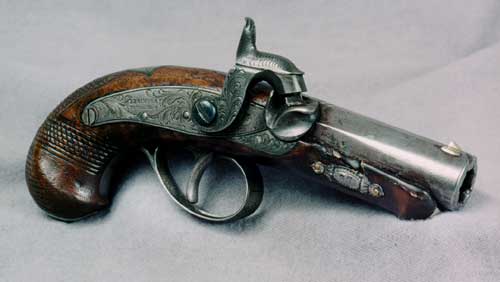
Nearing 8:00 p.m., he had one
final meeting with his coconspirators, at an unknown location. The final plan
was for Paine to assassinate Seward. Herold was to go with Paine to Seward's
home and assist him in escaping Washington. Atzerodt would shoot and kill
Vice-President Johnson, and Booth was to kill Lincoln. It was Booth's plan
that all the attacks would occur simultaneously at 10:15 p.m. Afterwards they
would all meet at the Navy Yard Bridge. From this location, they would all
travel to Surrattsville where they would pick up weapons and field glasses
from the tavern leased by John Lloyd.
At about 9:30 p.m., Booth
arrived at Ford's Theatre. Outside the theatre he called upon a man named Ned
Spangler to hold his horse in the alley behind the theatre. Spangler was still
busy with stage settings, so he asked another employee named Joseph C.
Burroughs to watch and hold the horse. Booth then went next door to a tavern
and ordered a bottle of whiskey and some water. A customer at the tavern who
knew Booth said to him, "You'll never be the actor your father was."
To this Booth replied, "When I leave the stage, I will be the most famous
man in America."
At 10:07 p.m., John Wilkes
Booth entered the lobby of Ford's Theatre. He went upstairs to the dress
circle, and saw in the distance the door that would lead him to Lincoln's
State Box. Seated outside Lincoln's State Box was Charles Forbes, the
President's footman. To get to Lincoln's box Booth had to get
past Forbes. Eventually, he handed Forbes a card that enabled him to pass.
Booth then entered an area that was dark, directly behind the door that lead
to the State Box. He then placed the wooden leg of a music stand that he had
put there earlier in front of the door, to block anyone from entering the
room. Removing the derringer from his pocket, he then opened the door directly
behind where Lincoln was seated. Booth walked a few steps toward the
President, and placed his derringer behind Lincoln's head near his left ear
and pulled the trigger.
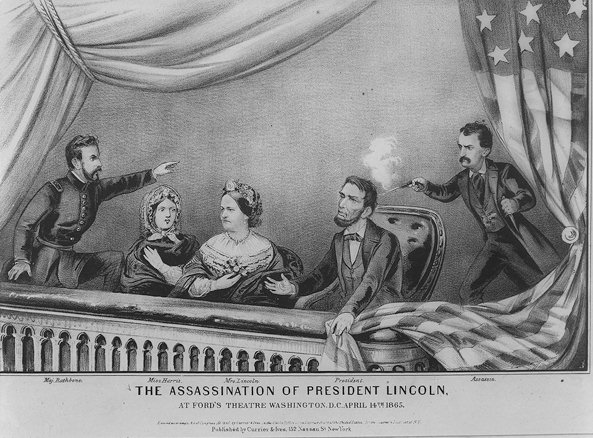
As Booth predicted, his shot
rang out during audience laughter, and most did not hear it. Sitting in the
box with Lincoln was Major Henry Rathbone and his fiancée Clara H. Harris.
(Although married in 1867, there future was tainted by Rathbone's inability to
forgive himself for not having protected President Lincoln. In time, his
torment drove him mad, and in 1894 he murdered Clara, resulting in him
spending his remaining years in an asylum). As Rathbone tried to subdue the
assassin, Booth pulled his knife and stabbed Rathbone in his left arm. Booth
then climbed over the banister of Lincoln's State Box and jumped eleven feet
to the stage floor. In doing so, the spur on his right foot caught one of the
decorative flags draped from the guardrail, causing him to land off balance,
breaking the fibula bone in his left leg just above his ankle. He pointed his
knife toward the audience, and fled out the back of the theatre, to his
waiting horse, and escaped into the night.
There are two stories as to
what Booth may have shouted just after shooting the President. Some audience
members believe he said "Sic semper Tyrannis," (Thus Always to
Tyrants), while others heard nothing. Major Rathbone stated that he thought
Booth shouted "Freedom," as he jumped from the box. Although many of
the people present did not agree on Booth's words, it seems commonly accepted
that he spoke the Latin phrase.
Sometime after 11:00 p.m., David Herold and
Booth, who both crossed the Navy Yard Bridge on their escape, met each other
around Soper's Hill. From here they traveled together en route to Lloyd's
Tavern, that was leased and operated by Mary Surratt in Surrattsville,
Maryland. The town's name was changed to Robeystown on May 3, 1865, and then
changed to Clinton on October 10, 1878, and remains so today.
At midnight, Booth and Herold
arrived at the tavern, after roughly an eleven mile journey from Ford's
Theatre. Once there, they drank whiskey and picked up the field glasses and a
Spencer rifle. In severe pain from the break in his leg, Booth needed medical
attention. Riding into the night, they came upon the house of Dr. Samuel Mudd
about four in the morning. Here, Dr. Mudd set Booth's leg. At this time, Booth
believed that his entire plan was a success. But, unknown to Booth, Paine
failed to kill Seward, although he did wound him, and Atzerodt refused to go
forward with his part of their plan, and never attacked Vice-President
Johnson.
On April 15, 1865 at 7:22
a.m., President Abraham Lincoln was pronounced dead, the result of a gunshot
wound inflicted by assassin John Wilkes Booth.
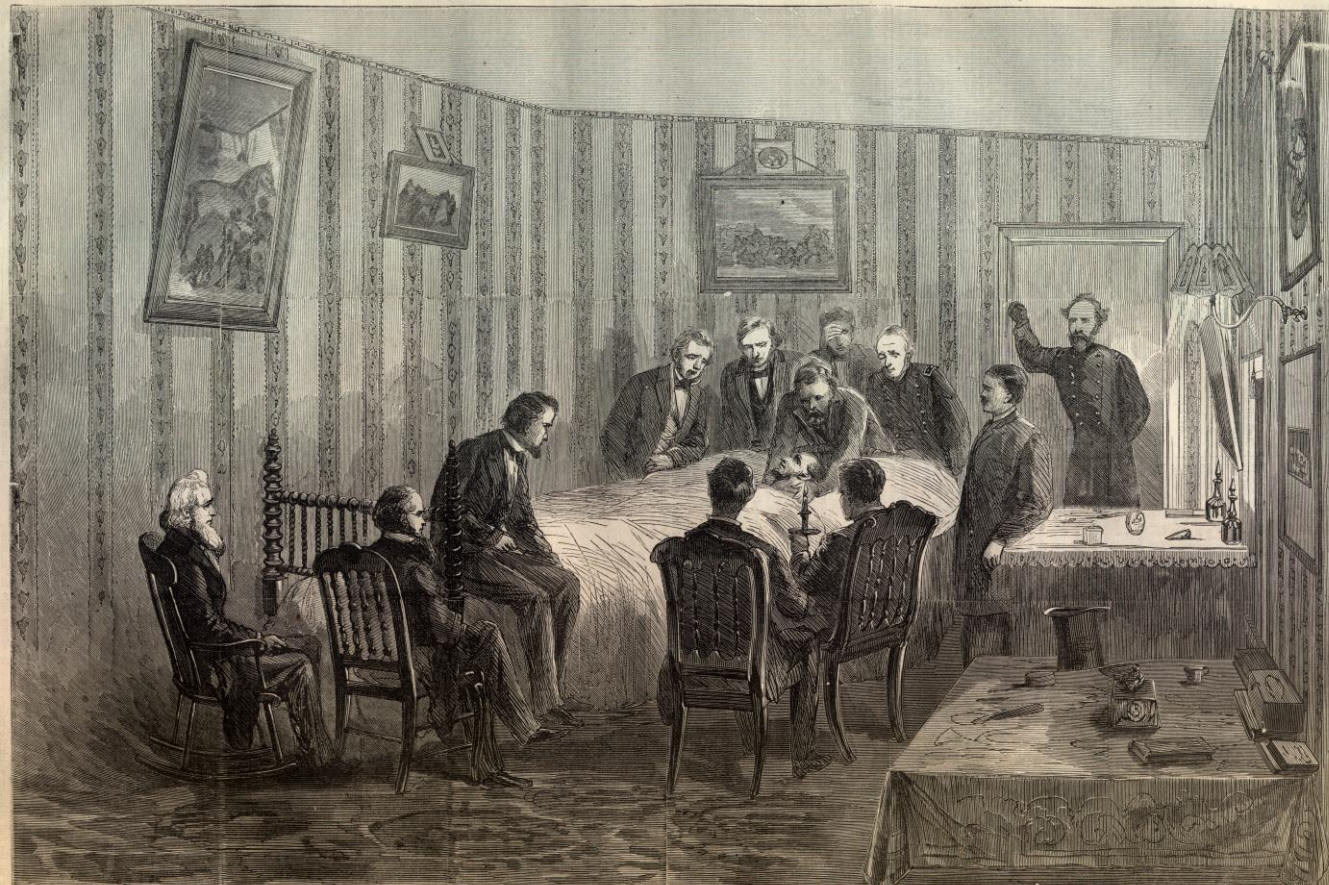
Just after Abraham Lincoln
had been shot on the evening of April 14, he was carried from his State Box at
Ford's Theatre across the street to the Petersen House, located at 453 Tenth
Street (now 516 Tenth Street). This house was owned by William Petersen, a
tailor, who rented out rooms. The room to which President Lincoln was taken
was rented by William T. Clark, who happened to be out of town. Being quite
tall, Lincoln did not fit on the bed, so he was placed on it diagonally. Extra
pillows were supplied so that Lincoln's head could be elevated. While Lincoln
was still alive, doctors, using a steel probe, located the .44 caliber lead
ball, but as it was lodged in his brain, removal was impossible. One
astonishing fact is that a few months before, this same room had been rented
by an actor named Charles Warwick. On one occasion, John Wilkes Booth visited
Warwick and fell asleep on the same bed on which Lincoln would later die .
The Search for Booth
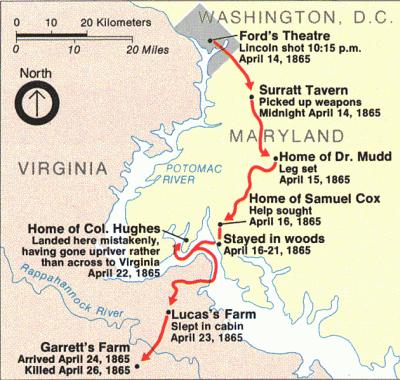
After Dr. Samuel Mudd set
Booth's leg, he and David Herold stayed at the Mudd house until the following
night. On April 16, in their flight from Federal authorities, who were closing
in, they arrived at the home of Samuel Cox. Here, Cox gave them food and hid
them in the woods. On April 17, while President Lincoln's body was lying in
state at the East Room of the White House, Booth and Herold arrived in Port
Tobacco, Maryland, on the banks of the Potomac River. Here they searched for a
way to cross the river. Finally, after hiding out in Port Tobacco for a few
days, they crossed the Potomac River in a small fishing boat on April 20.
Meanwhile, Federal troops were searching for them, as well as anyone connected
with the assassination.
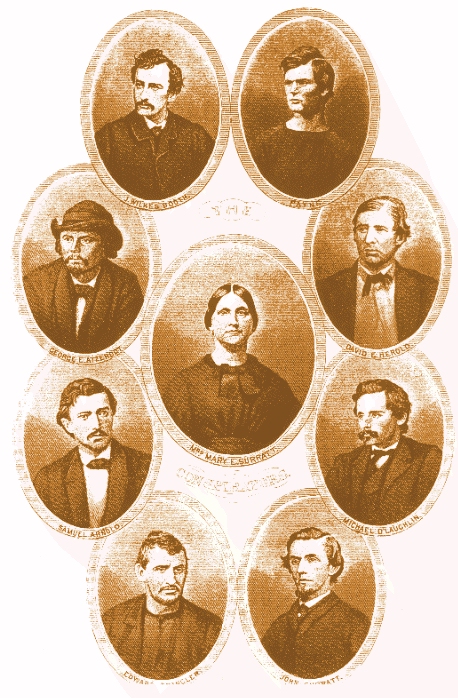
The Booth Conspirators
On April 24, Booth and Herold arrived at Port
Conway, Virginia. The next day, Federal troops traced Booth and Herold to a
farm owned by Richard H. Garrett, south of the Rappahannock River. Another man
named William Jett was a friend of Richard Garrett. It was Jett who provided
refuge for Booth and Herold at Garrett's farm. As he was never brought to
trial for aiding the two fugitives, Jett later settled in Baltimore as a
tobacco salesman. He died in an asylum, punishing himself for
the trouble he brought to Richard Garrett for hiding Booth and Herold.
On April 26, Federal troops surrounded the
tobacco shed in which Booth and Herold were hiding on the Garrett farm. Herold
surrendered, but Booth refused. Time and again, Federal soldiers ordered Booth
to surrender and each time, he failed to give up. To force
him out, the Federal soldiers set fire to the shed, and just as they did so, a
shot was heard, and Booth fell mortally wounded.
The origin of the shot, whether by a soldier
or self-inflicted is actually unknown, although it is credited to Sergeant
Boston Corbett, one of the Federal soldiers. Booth had been shot in the neck.
As he lay wounded, Federal soldiers carried him from the shed and placed him
on the porch of the Garrett home. One of the soldiers was sent to Port Royal
for a doctor, who did not arrive until daylight. When Booth was carried from
the tobacco shed to the porch he was unconscious, but soon came to. The doctor
had arrived while Booth was still alive, and tried to give him some medicine.
Booth, shaking his head said that it was useless and further stated, "Tell
my mother that what I did I did for the good of the country." Meanwhile,
the shed had burned to the ground, and soldiers were hunting in the ruins for
vestiges. They found two revolvers, that were ruined in the fire, however one
Federal soldier found Booth's carbine rifle. Booth died about three hours
after being placed on the porch. His body was wrapped in a blanket, laced in a
wagon and driven to Acquia Creek, Virginia.
Once at Acquia Creek, Booth's body was placed
on a boat, as well was Herold, who was closely guarded. Booth's body was taken
to Washington, D.C. where an autopsy was performed. Booth was then buried in
an unmarked grave at Arsenal Penitentiary. Today, the grave of John Wilkes
Booth is located in Green Mount Cemetery in Baltimore, Maryland.
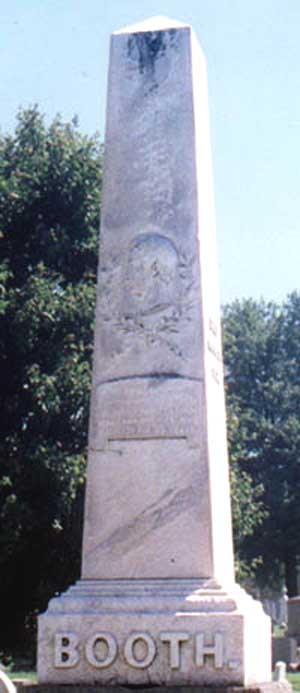
Note: In recent years, there has been
speculation that Booth's body is not that lays in his grave, whereby others
believe he had escaped capture and lived to an old age. This has not been
proven, and authorities indicate that he did die as related herein.
John Wilkes Booth's brother, Edwin, anguished
over the senseless act committed by his brother, expressed his sorrow in an
open letter to the citizens of the United States. It read:
New York, April 20, 1865
To the people of the United States.
My fellow citizens:
When a nation is
overwhelmed with sorrow by a great public calamity, the mention of private
grief would under ordinary circumstances be an intrusion, but under those by
which I am surrounded, I feel sure that a word from me will not be so regarded
by you.
It has pleased God to lay
at the door of my afflicted family the life-blood of our great, good and
martyred President. Prostrated to the very earth by this dreadful event, I am
yet but too sensible that other mourners fill the land. To them, to you, one
and all go forth our deep, unutterable sympathy; our abhorrence and
detestation of this most foul and atrocious of crimes.
For my mother and sister,
for my two remaining brothers and my own poor self, there is nothing to be
said except that we are thus placed without any agency of our own. For our
loyalty as dutiful, though humble, citizens, as well as for our consistent,
and as we had some reason to believe, successful, efforts to elevate our name,
personally and professionally, we appeal to the record of the past. For our
present position we are not responsible. For the future --alas! I shall
struggle on, in my retirement, with a heavy heart, an oppressed memory and a
wounded name --dreadful burdens -- to my welcome grave.
Your afflicted friend,
Edwin Booth
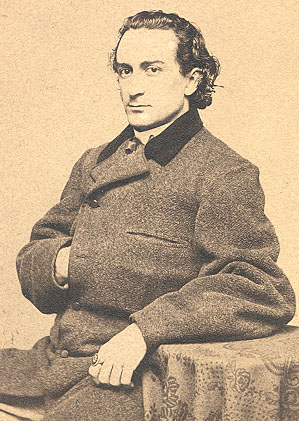
In 1863, Edwin Booth's wife,
Mary Devlin died. In 1865, he was still mourning her death when this dreadful
act by his brother struck him another hard blow. In his letter above, he vowed
to never perform again. However, when extreme debt drove him back to the
stage, less than a year later, his public celebrated. Not blamed for the act
of his brother, Edwin regained his name and trust of the citizens of the
United States, and was welcomed as a performer on the stage. Not far from
their home at Tudor Hall, is the Edwin Booth Theater, so named in his honor.
It is located on the campus of Harford Community College, in Bel Air,
Maryland.

The Surratt House and Museum,
Clinton, Maryland
http://www.surratt.org/
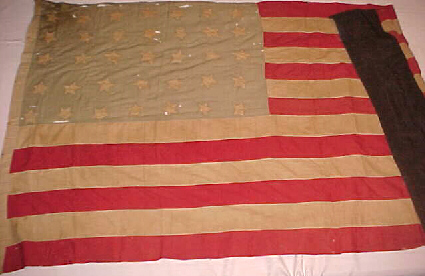
This is a photograph of an actual
US Flag that was hand made by my great grandmother, Mrs. John Daniel
Webster Thayer, originally intended to be flown at the end of the
Civil War in 1865. The black mourning stripe was added and
flown for the funerals of Abraham Lincoln, James A. Garfield,
Ulysses S. Grant, Warren Harding, and William McKinley. In
1941, she gave this flag to my father, William John Marck, Jr., who
passed it down to me in 2008. Sadly my father passed away on July
25, 2008. This flag has been in my family since 1865. As it was
first flown for the funeral of Abraham Lincoln, I thought it
appropriate to include it here.

Copyright © 1993-2022 by John T. Marck. Information for
this article came from a variety of excellent sources. These include: Tudor
Hall, Bel Air, Maryland, the home of John Wilkes Booth, and to Howard and
Dorothy Fox, who spent many hours with me telling me stories of Booth and his
last days, as well as his family, living at Tudor Hall; The Surratt House
Museum, Clinton, Maryland; My father, William John Marck, Jr., a historian and
teacher; Springfield, Illinois and the National Park Service at the Lincoln
Home National Historic Site; Blood On The Moon, by Edward Steers, Jr.,
The University Press of Kentucky, 2001; A True History of the Assassination
of Abraham Lincoln and of the Conspiracy of 1865 by Louis L. Weichmann,
Alfred A. Knoff Publisher, New York 1979; Lincoln by David Herbert
Donald, Simon and Schuster, 1995; The Death of Lincoln by Clara
E. Laughlin; and the section, "The Objects of Lincoln and Booth," from
Time-Life; The Escape and Capture of John Wilkes Booth by Edward Steers; and
information received from a speech by Kate Clifford Larson about Mary Surratt
regarding her book, "The Assassin's Accomplice: Mary Surratt and the
Plot to Kill Abraham Lincoln" et al. Please also see:
www.aboutfamouspeople.com/article1147.html
|

